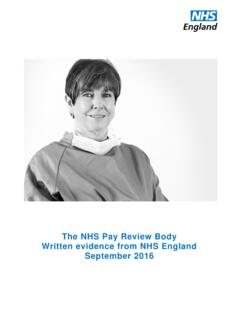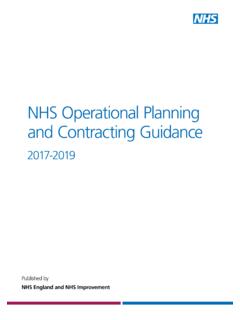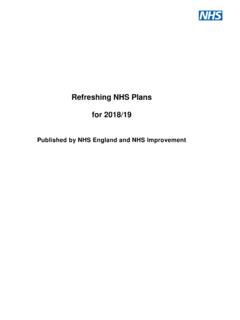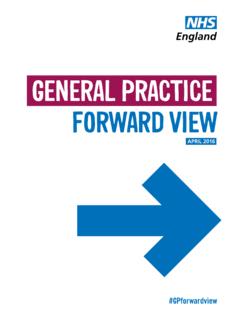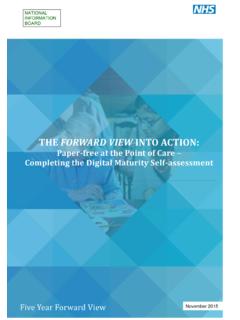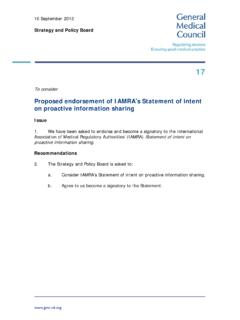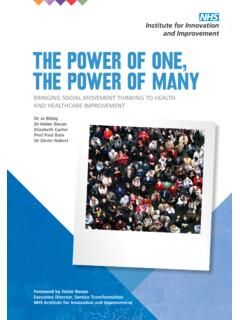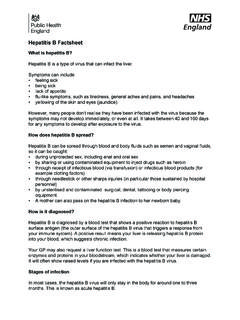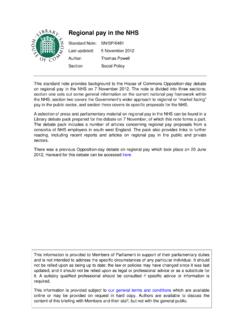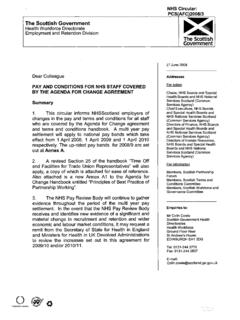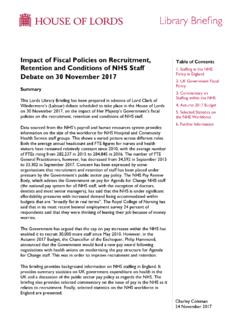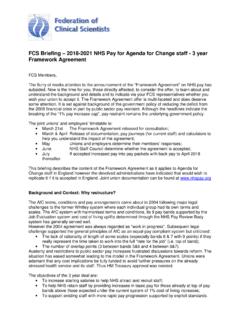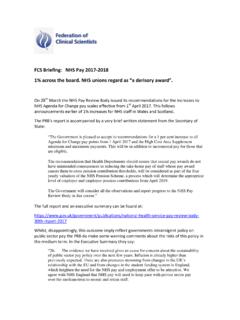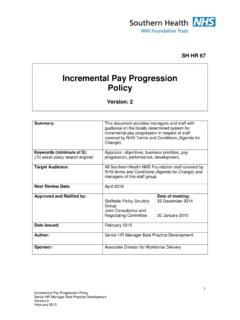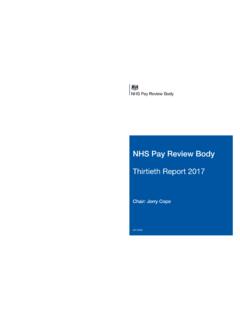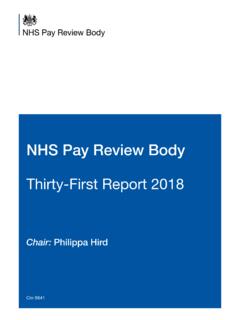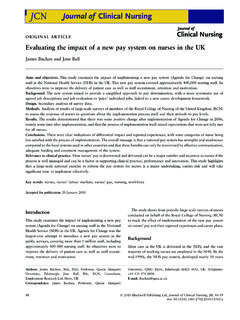Transcription of DN UPDATE THIS COVER IN AUGUST The NHS Pay Review …
1 DN UPDATE THIS COVER IN AUGUST The NHS Pay Review body Written evidence from NHS England September 2015 1 The NHS Pay Review body : NHS England s Evidence for the 2016 Review Version number: First published on 30 September 2015. Prepared by: Andrew Laycock Senior Finance Manager National Primary Care Contracts Strategic Finance NHS England Room 8E10 Quarry House Quarry Hill Leeds LS2 7UE Classification: official The National Health Service Commissioning Board was established on 1 October 2012 as an executive non-departmental public body . Since 1 April 2013, the National Health Service Commissioning Board has used the name NHS England for operational purposes. 2 Contents Chapter 1: introduction 3 Background 3 Chapter 2: reform of the workforce to help deliver NHS priorities 4 Introduction 4 Five Year Forward View UPDATE 4 Conclusion 5 3 Chapter 1: introduction Background This document contains written evidence from NHS England to inform the NHS Pay Review body (PRB) report on 2016/17 pay for their remit group.
2 In a letter to the Chair of the PRB which is to follow, a Department of Health Minister will set out the detailed evidence to be provided to you. Affordability and funding constraints NHS England is funded by the Department of Health to commission health services as required under the NHS Constitution and the NHS Mandate, with objectives to deliver improved health outcomes. In 2015/16, NHS England was allocated 101 billion of funding. NHS England is funded by the Department of Health to commission health services as required under the NHS Constitution and the NHS Mandate, with objectives to deliver improved health outcomes. NHS England s budget for 2016/17 has not yet been set, as the Department of Health s total resource allocation is subject to outcome of the Spending Review . The Spending Review will be published on 25 November 2015 and we expect that the Department of Health will make decisions on budgets shortly thereafter.
3 Nevertheless, it is clear that the next five years will continue to require very significant further financial savings and efficiency improvements, similar in scale to those needed over the last five years. Whilst the Government has committed to provide additional real terms funding growth for the NHS over the next five years, NHS England s analysis, set out in the Call to Action1 and updated in the Five Year Forward View2 identified funding pressures of around 30 billion by 2020/21. As a result, it is imperative that all providers in the service make savings and deliver efficiency gains each year. In March 2014, the previous administration announced that the 1% public sector pay cap would be extended by a further year to include 2016/17. This position has been endorsed by the current administration and the Chancellor has also announced that the 1% pay cap will be extended to COVER the next four years in his 8 July 2015 budget.
4 On the basis of the above, we would urge the NHS PRB to carefully consider what, if any, uplift is appropriate for 2016/17. 1 Available at: 2 Available at: 4 Chapter 2: reform of the workforce to help deliver NHS priorities Introduction This chapter relates to information on staff employed across the NHS, including by NHS England. Five Year Forward View UPDATE The Five Year Forward View set out a number of proposals for how the NHS needs to change to take account of the opportunities that science and technology offer, and also to evolve to meet new challenges: the population is living longer, with complex health needs. These proposals included delivering new models of care, and delivering health care services seven days of the week in a sustainable way. Indeed, as part of the efforts to inform how this work progresses the NHS PRB was given a special remit by the Parliamentary Under Secretary of State for Health requesting that the NHS PRB consider the barriers and enablers within the Agenda for Change pay system for delivering healthcare services every day of the week in a financially sustainable way.
5 The NHS PRB requested evidence, including from NHS England, Department of Health and others, to help inform their thinking on this work. NHS England provided its written evidence3 to the NHS PRB which was subsequently published in January 2015. In July 2014, the NHS PRB provided their response to Ministers in their report on this work, entitled Enabling the delivery of healthcare services every day of the week the implications for Agenda for Change. 4 This report gives a welcome insight into the NHS PRB s views on this area. Other evidence providers, most notably the Department of Health who have overall responsibility for workforce policy and strategy will wish to respond to the report themselves. NHS England continues to consider the issues and implications of implementing services for urgent and emergency care on every day of the week including the impact on staffing and costs. We agree with the NHS PRB s observation that further work is needed to identify and understand scenarios for providers locally, including how to introduce seven day services most efficiently across the system.
6 Having said that, NHS Improving Quality has gone some way towards collecting and publishing evidence about what works. 3 Available at: 4 Available at: 5 Conclusion In summary, the NHS continues to face a period of unprecedented challenge. As we have stated previously, this is no secret. We have been completely open and transparent and articulated the position originally in A Call to Action, to initiate an open and honest public debate about the future shape of the NHS in order to: a. meet rising demand; b. introduce new technology; and c. meet the expectations of its patients. That narrative was expanded upon in the Five Year Forward View, which reiterated that the NHS needs to deliver productivity gains, savings and efficiencies of 22 billion by 2020/21. The NHS PRB will wish to consider very carefully what, if any, uplift it considers appropriate for 2014-15. This is particularly pertinent given the difficult funding situation.
7 In addition, any increase in staff pay would take away resources which could otherwise be used on improving other aspects of patient care. However, the NHS PRB will need to balance this off against the potential risks to recruitment and retention issues in the longer term.
